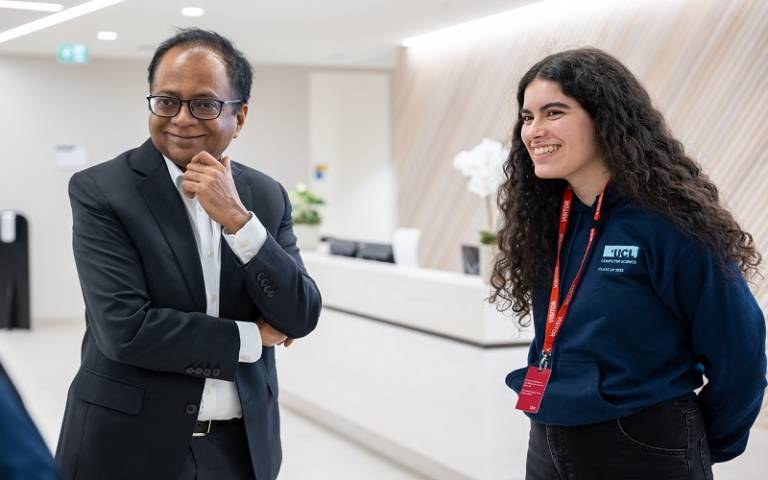No other university programme collaborates as closely with industry. You are prepared for your future careers while being fully supported by UCL teaching staff.
 What is UCL IXN?
What is UCL IXN?

The UCL Industry Exchange Network (IXN) gives UCL Computer Science students hands-on experience with industry as part of their degree.
Through UCL IXN, hundreds of students have worked on technologies that address real-world problems. The UCL Computer Science department is uniquely allied with over 300 organisations that provide work experience to students throughout every year of their course.
Our partners are tech corporations, including Microsoft, IBM, NTT DATA, Intel, Google, Facebook and Amazon, international banks, cutting-edge small businesses and gaming companies. UCL IXN projects have also driven digital innovation in the NHS and global charities.
Benefits of UCL IXN
You are equipped for the world of work
The industry experience gives you a competitive advantage in the job market. It helps you develop your technical abilities and softer skills, such as teamworking and communication skills.
Access to industry leaders in computer science
The programme links you with inspirational mentors and speakers who guide and support you alongside your academic teachers and are important connections for future jobs.
Projects that make a difference
You see the impact of your work on a business or a societal challenge.
The IXN methodology
The IXN pedagogy focuses on problem-based learning. We provide you mentors, materials, data and methods to achieve success with projects that complement your taught modules.
The exclusive motivation-tracking approach captures your interests and long-term plans to match you to suitable projects.
Established by Professor Dean Mohamedally and Professor Graham Roberts in 2011, the IXN programme has been endorsed as best practice by the UK government.
How UCL IXN works
All UCL IXN projects are term-time, and every company has a technology mentor collaborating with the UCL supervisor.
Undergraduate students
Undergrads spend 25% of their time on UCL IXN projects (of four study modules, one is an IXN project).
Master's students
Master's students work on UCL IXN projects full-time for their summer dissertations.
Eligibility
Most students in MEng or MSc programmes can take part in UCL IXN; those enrolled in the Mathematical Computation MEng course are ineligible.
What projects could I work on?
IXN projects are at the forefront of innovation. You work on proofs of concepts to tackle problems that organisations want to solve. Many have a tech for good angle.
These examples show the breadth of the IXN projects:
UCL MotionInput is a touchless computing software package developed over successive years by students, academics, Intel, Microsoft, IBM and the NHS. MotionInput revolutionises computer use for people with mobility issues and is publicly available worldwide.
Franklin Immersive Social Engagement (FISE) experiments were established with IBM during the Covid pandemic. The project looked at how technologies can reduce social isolation.
An animal conservation project with Microsoft tracked elephants to keep them away from poachers.
Archi-Lens: Blockchain and Physical Digital Reality is a proof of concept that uses blockchain and augmented reality to drive continuous improvement in the construction industry. The partner, consultancy firm Avanade, developed it into a smart engineering product.
UCL spinout Odin Vision uses artificial intelligence to improve traditional colonoscopy methods increasing cancer detection rates. UCL Master's students helped the company investigate new areas of machine learning.
Can artificial intelligence be used to predict financial risk? Santander has worked with UCL Master's students for over six years exploring this topic.
What our students say
"UCL IXN allowed me to meet the very top people in my fields of study. To have people in such high positions review my work was amazing. I think this is something you would only get from an IXN project.
"I not only learned skills that were so useful for the world of work, but it also helped me identify the sort of computing job that I wanted to do.
"I received so much assurance from UCL and the partners that I felt empowered to do the role."
Sinead Tattan, final year student
"I gained invaluable knowledge and skills. I increased my technical understanding and developed my leadership abilities. My confidence and ambition have grown thanks to my role and the support of the teaching team."
Anelia Gaydardzhieva, Master's student
What our partners say
"The UCL IXN students are invariably excellent. They are a rare mix of dedication, effort, hard work and talent. And they seem to have all these things in abundance. I expect it's the ethos of the teaching at UCL that instils this in the students."
Professor John McNamara, IBM Master Inventor and UK University Programs Lead
"We really love working with the UCL IXN programme because it's the best of its kind. It is unique in the academic-industrial outreach space."
Tom Winstanley, CTO & Head of New Ventures at NTT DATA UK & I
"The students strive to enhance or improve the world around them and are not afraid of tackling big problems. Helping the teams lean in and develop solutions using Intel technology to drive positive change is a real joy."
Professor Pippa Chick, Sales Director: Energy, Retail, Transportation, Health & Life Sciences: EMEA
"We regard the IXN programme as a 'win-win' situation. UCL wins because the students gain industrial experience of a 'real problem'. We win because the students can explore (and sometimes solve) a problem that is relevant to what we do. Both sides can benefit from what we think of as a three-month long interview."
Dr Peter Mitic, Head of Operational Risk Methodology UK, Santander UK
"GOSH DRIVE is delighted to collaborate with the UCL IXN programme. The programme allows us to engage with talented and enthusiastic computer science students who are keen to develop technology that has the potential to change lives."
Professor Neil Sebire, Chief Research Information Officer and DRIVE Managing Director
 Close
Close

